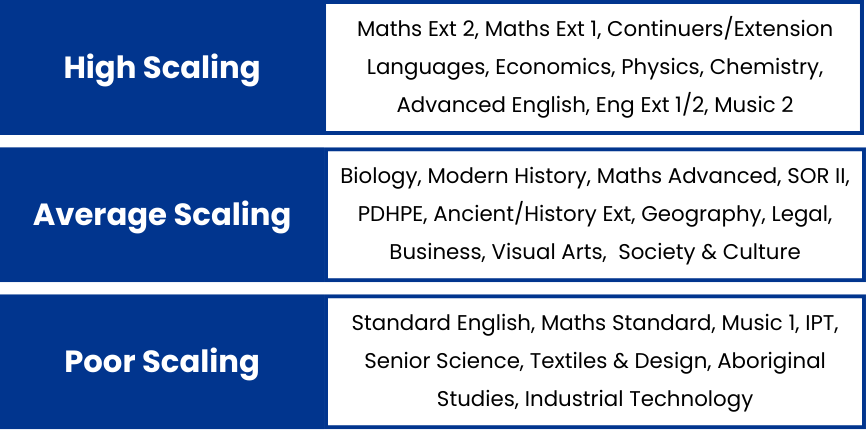HSC Scaling Explained
If you’re in Year 11 or 12, you’ve probably heard of HSC scaling - and maybe you’re a little confused about what it actually means. Is it about how “hard” a subject is? Does it change your raw marks? And most importantly, how does it affect your final ATAR?
At Pinnacle Learners, we believe in making complex things simple. Scaling is one of the most misunderstood parts of the HSC, but once you know how it works, it becomes much less scary, and even something you can use to your advantage.
In this blog, we’ll explain what HSC scaling is, why it matters, and how you can use this knowledge to make smarter subject choices, set realistic goals, and maximise your ATAR.
Lets get started.
What Is HSC Scaling?
HSC scaling is a process used to fairly compare marks across different subjects. Not all HSC courses are the same: some attract stronger academic students (like Maths Extension 2), while others have different challenges and skill sets. Because of this, raw HSC marks can't be directly compared, or else it would unfairly advantage those taxing simpler courses.
Think of it like converting money from one currency to another. Just like $1 is not equal to £1, a mark of 90 in one subject may not be equal in value to a 90 in another. Scaling adjusts marks so students aren't unfairly advantaged or disadvantaged based on their subject choices.
Your final HSC mark for each course is made up of two components: your assessment mark and your exam mark. The assessment mark is based on your performance in internal school tasks throughout the year, such as assignments, in-class tests, and other assessments. The exam mark comes from your performance in the external HSC exam set by NESA. These two marks are then averaged to produce your final HSC mark.
Scaling only applies to your external mark - a different process is applied for the internal mark called ‘moderation.’
How Does Scaling Work?
The scaling process is designed to create a level playing field. It works like this:
Your raw HSC marks are compared with how students in your course perform across all their other courses.
Subjects where most students also perform well in other subjects (e.g., Physics or Maths Extension 2) often scale higher.
Subjects where students perform at an average level across the board scale lower.
Importantly, your scaled marks, not your raw HSC marks, are used to calculate your ATAR.
📈 Subjects That Generally Scale Well (and Those That Don’t)
While scaling should not be the only factor in choosing your subjects, it’s helpful to understand how different courses tend to scale. High scaling subjects will generally push your marks up, but you need to be achieving at least 70/75 for scaling to be of benefit.
Subjects with more varied or less academically competitive cohorts tend to scale lower. If you take poor scaling subjects, aim to rank highly and achieve top marks, a strong result in any subject will always benefit you, regardless of its scaling trend.
ATAR and Subject Selection
To be eligible for an ATAR, you must complete at least four subject areas. However, your ATAR will be calculated using:
Your best 2 units of English (this is mandatory)
Your next best 8 units, regardless of the subject area
Example: Even if your English marks are your lowest, they must still be included.
So yes — subject selection matters. But choosing a subject just because it "scales well" isn't always the best idea. You’ll still need to perform well to get the benefit of good scaling.
Real-Life Scaling Example
Here’s how scaling can affect your marks. Let’s say you received the following HSC marks. English Standard (because of its poor scaling) would be pulled down to a 62 in ATAR calculations, even though an 81 isn’t a poor mark. This student would probably have been better off taking Advanced, even if their HSC mark was slightly lower, as their scaled mark would have been higher.
What Can You Do to Maximise Your ATAR?
At Pinnacle Learners, we recommend these actionable steps:
1. Choose Subjects You Enjoy and Excel In
Scaling only helps if you score highly (ie 70-80%). Pick subjects you’re confident in: you are more likely to put in the work and commit to studying if it’s a topic you’re genuinely passionate about and interested in. Try to think about which subjects from junior years you have enjoyed and done well with.
2. Understand Scaling, But Don’t Obsess Over It
Use scaling as one of many tools to plan your HSC strategy - not the only one. Choosing subjects you hate that scale well will not give you a better mark. However, for certain subjects, it may be a deciding factor. For example, English Standard scales horrendously, so we advise our students to pick English Advanced for Year 11, and if they perform poorly, then to drop down in Year 12. If you choose standard straight away, and turn out to preform well in Year 11, your mark will get dragged down by scaling.
3. Aim for Top Ranks in School
Your internal ranking affects your moderated assessment mark. Work consistently throughout the year. Depending on your school, being in the top 10 or 20 may guarantee you a band 6. If you are at a selective or high achieving private school, it may be easier to get Band 6 results due to the schools higher performance, but going to an ‘average’ school doesn’t disqualify you from doing well- you’ll just need to rank higher.
4. Get Help When You Need It
If you're struggling to understand specific topics in your subjects - whether it's analysing unseen texts in English, breaking down historical sources, or tackling tricky maths problems - getting one-on-one help can make a big difference. At Pinnacle Learners, our tutors work with you to target the exact areas you're finding challenging. We explain concepts in simple terms, help you apply them through practice questions, and guide you step-by-step through past papers. Our focus is on building your subject knowledge, improving how you approach assessments, and helping you feel more confident and in control of your learning.
Final Thoughts
HSC scaling can feel confusing at first, but once you understand the basics, it becomes a powerful tool to help you make informed subject choices and study decisions. The key is to focus on doing well in the subjects you enjoy.
If you’re unsure about how scaling affects your courses or want personalised advice, Pinnacle Learners is here to help. Whether you're aiming to boost your exam performance, improve your internal rankings, or simply feel more confident in your subjects, our tutors provide the support you need—tailored to your goals.
Have questions about scaling, subject selection, or the ATAR?
Reach out to us anytime at info@pinnaclelearners.com.au — we’re here to help.





